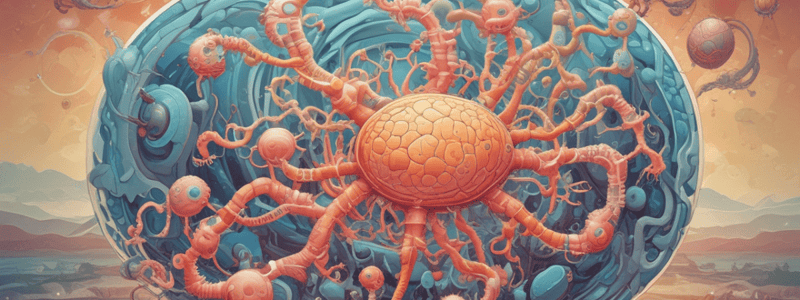Podcast
Questions and Answers
Which feature is characteristic of a Rho-independent terminator?
Which feature is characteristic of a Rho-independent terminator?
- G-C rich stem (correct)
- 50-90 bp sequence
- helicase activity
- involvement of Rho factor
What is the role of the Rho factor during transcription termination?
What is the role of the Rho factor during transcription termination?
- Forming a hairpin loop
- Binding to DNA
- Elongating the RNA chain
- Binding to RNA and separating RNA-DNA (correct)
What directly stops the chain elongation of RNA during transcription?
What directly stops the chain elongation of RNA during transcription?
- Transcription-termination signal (correct)
- Rho hexamer
- mRNA degradation
- RNA polymerase
In the hot pursuit model, where does the Rho factor initially bind?
In the hot pursuit model, where does the Rho factor initially bind?
What is a common feature between Rho-independent and Rho-dependent termination?
What is a common feature between Rho-independent and Rho-dependent termination?
During which stages does RNA synthesis occur?
During which stages does RNA synthesis occur?
What is the function of the β subunit in the E. coli RNA polymerase?
What is the function of the β subunit in the E. coli RNA polymerase?
Which part of the promoter is known as the Pribnow box?
Which part of the promoter is known as the Pribnow box?
What is the designation for bases immediately following the transcript initiation site?
What is the designation for bases immediately following the transcript initiation site?
Which protein is released after RNA polymerase undergoes a conformational change during transcription initiation?
Which protein is released after RNA polymerase undergoes a conformational change during transcription initiation?
What is the role of rho (ρ) in transcription termination in E. coli?
What is the role of rho (ρ) in transcription termination in E. coli?
Which component of the RNA polymerase holoenzyme is specifically required for the initiation of transcription?
Which component of the RNA polymerase holoenzyme is specifically required for the initiation of transcription?
Which of these sequences is found at the -35 region of a promoter in E. coli?
Which of these sequences is found at the -35 region of a promoter in E. coli?
What is a common feature of many terminators that signals the end of transcription?
What is a common feature of many terminators that signals the end of transcription?
Study Notes
E.Coli RNA Polymerase
- The core enzyme consists of α, β, β', and ω subunits.
- The holoenzyme is composed of α2, β, β', ω, and σ subunits.
Functions of RNA Polymerase Subunits
- α subunit is responsible for assembling the tetrameric core.
- β subunit has a ribonucleoside triphosphate binding site.
- β' subunit is the DNA template binding region.
- σ subunit initiates transcription.
Promoters
- E.coli promoters must be at least 12 bp to avoid random occurrence.
- Promoters have limited sequence conservation.
- Four main regions of promoters are:
- Startpoint
- -10 sequence (Pribnow box)
- -35 sequence
- 17 nucleotide spacer sequence between -10 and -35 sequences
Transcription Unit Numbering
- The transcript initiation site is denoted as +1.
- Bases preceding the initiation site have minus (-) prefixes and are referred to as upstream sequences.
- Bases following the initiation site have plus (+) prefixes and are referred to as downstream sequences.
Starting Transcription
- RNA polymerase holoenzyme binds to a promoter region in DNA.
- Localized unwinding of DNA strands occurs around the -10 region.
- Phosphodiester bonds form between the first few ribonucleotides in the nascent RNA chain.
- A conformational change in the enzyme occurs, and the promoter is cleared.
- Sigma factor is released, and Nus A protein binds to form an "antitermination complex" for elongation.
Terminating Transcription
- Transcription stops when RNA polymerase encounters a terminator.
- The RNA product dissociates from the DNA template.
- Many terminators are hairpin-forming sequences.
- Two types of terminators exist in E.coli:
- Rho-dependent terminators
- Rho-independent terminators
Rho-Independent Termination
- Rho-independent terminators have a G-C rich stem and a 7-9 base U-run after the loop.
- U-DNA pairing is very weak, allowing dissociation.
Rho-Dependent Termination
- The Rho factor is a 46-kD protein that functions as a hexamer.
- Rho binds to RNA and has helicase activity.
- The Rho-dependent termination process involves the "hot pursuit model":
- Rho binds to the RNA tail and moves along the transcript until it catches the polymerase.
- Rho's helicase activity causes RNA-DNA separation.
Key Points
- RNA synthesis occurs in three stages: initiation, elongation, and termination.
- RNA polymerases are complex multimeric proteins.
- Covalent extension of RNA chains occurs within locally unwound segments of DNA.
- Chain elongation stops when RNA polymerase encounters a transcription-termination signal.
- Transcription, translation, and degradation of mRNA molecules often occur simultaneously in prokaryotes.
Studying That Suits You
Use AI to generate personalized quizzes and flashcards to suit your learning preferences.
Description
Learn about the stages of transcription in prokaryotes, including the structure and functions of E. coli RNA polymerase and promoters. Understand the role of subunits and regions involved in transcription initiation.




